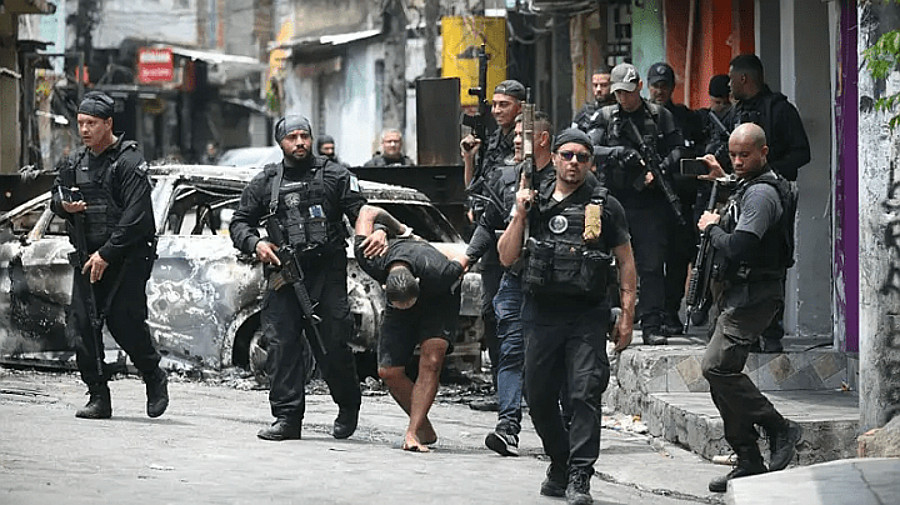|
Massacre in Rio. Brazil: Where are the drug traffickers? It's easy to imagine that in Brazil, with organized crime on a much larger scale, "donations" to political candidates are more significant. But what's most surprising (or perhaps not so surprising) is that the prime suspects are Tarcisio de Freitas and Claudio Castro, the current governors of São Paulo and Rio de Janeiro, respectively. Both are Bolsonaro supporters seeking to succeed their leader, who was recently sentenced to 27 years in prison for attempting a coup and plotting to assassinate current President Lula and Supreme Federal Court Justice Alexandre de Moraes. Tarcisio de Freitas received a campaign contribution from a suspect under investigation by the Paraná federal police, who is allegedly involved in a PCC money laundering scheme. The woman in question is Maribel Schmittz Golin, a cattle rancher who donated R$500,000 (approximately US$100,000) to the current governor's 2022 election campaign ( Folha de São Paulo, July 29, 2025 ). Meanwhile, the governor of Rio de Janeiro, the same one who sent 2,500 police officers to massacre residents of the favela, told the Brazilian press that there is no connection between organized crime and politics. O Globo, for its part, published a photo shoot with former congressman Thiego Raimundo de Oliveira Santos, alias TH Joias (MDB), who is imprisoned for supplying weapons to Comando Vermelho. Drugs and weapons, which often outnumber the army itself, are not manufactured in Brazil, yet they enter the country through some border crossing. And this is the responsibility of the federal government. Lula seems more concerned with the approval of the Security Amendment he presented in Congress, which would require different police forces to act jointly, as if the police themselves weren't involved in drug trafficking. Lula said he was horrified by the massacre but didn't call for an immediate investigation into who was responsible. His policies and rhetoric reflect the new reality, in which a significant portion of the population approves of the operation in Rio's favelas. After all, Governor Castro also considered this electoral calculation. What is the reason for this brutal massacre? Many will wonder what the motive is for this massacre in Rio, given that massacres of Black and poor people are commonplace, under the pretext of drug trafficking or any other excuse. The MRT (Revolutionary Workers' Movement) of Brazil, part of the International Network La Izquierda Diario and the Trotskyist Fraction-Fourth International, denounces a long list of these crimes in their statement, highlighting their shared racist origins. After Jair Bolsonaro's imprisonment, the Bolsonaro clan and its supporters were weakened, further weakened by the massive protests that prevented right-wing members of Congress from granting amnesty to their leader. Moreover, a sense of national sovereignty rejected the interference of U.S. imperialism in Brazil. This was evident in the nationwide mass demonstrations. It is clear that the far right sought to regain ground and a certain balance of power by portraying itself as fighting drug trafficking while simultaneously employing racist terror against the poorest populations. In Argentina, the right-wing Milei faction, emboldened by the election results, is exploiting the Rio massacre to wage its own reactionary campaign across all television channels. But let's not forget that many of those who claim to be fighting drug trafficking were hiding their campaign financing. Even Security Minister Patricia Bullrich has to answer for José Luis Espert's ties to drug trafficker Fred Machado, and for President Milei sharing the same lawyer. And above all, there's the question of Bullrich's own relationship with the owners of Lácteos Vidal SA, who appear in a dozen transactions in the "Machado case" and contributed to the PRO candidate's 2023 campaign. FITU deputy Christian Castillo raised all of this with the minister in the budget committee, and she remained silent. https://www.laizquierdadiario.com/Brasil-donde-estan-los-narcos? Back |
|
||||||
|
|||||||




